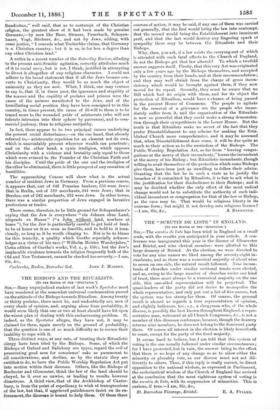THE BISHOPS AND THE RITUALISTS.
(TO TRH EDITOR OF TUB 'SPECTATOR.')
SIR,—Many unprejudiced readers of last week's Spectator must have wondered at the somewhat universal condemnation passed on the attitude of the Bishops towards Ritualism. Among twenty or thirty prelates, there must be, and undoubtedly are, men of .every shade of opinion, and, arguing alone from probability, it would seem likely that one or two at least should have hit upon the wisest plan of dealing with this embarrassing problem. If, indeed, as the Spectator alleges, they have not, it may be claimed for them, again merely on the ground of probability, that the question is one of so much difficulty as to excuse their inability to cope with it.
Three distinct ways, at any rate, of treating their Ritualistic clergy have been tried by the Bishops. Some, of which the Bishops of Oxford and Salisbury are types, regard the evil of prosecuting good men for conscience' sake as paramount to .all considerations, and decline, as by the statute they are entitled.to do, to have the Public Worship Regulation Act put into motion within their dioceses. Others, like the Bishops of Rochester and Gloucester, think the law of the land should be -obeyed, be it ever so unwise, or leading to results however .dieastrons. A third view, that of the Archbishop of Canter- .bury, is from the point of expediency to wink at transgressions of the law, but that, if aggrieved parishioners insist on its en- forcement, the diocesan is bound to help them. Of these three courses of action, it may be said, if any one of them was carried out generally, that the first would bring the law into contempt, that the second would bring the Establishment into imminent peril, and that the last would destroy any lingering spark of sympathy there may be between the Ritualists and their Bishops. Why, then, you ask, if a law exists the carrying-out of which is attended with such fatal effects to the Church of England, do not the Bishops get that law altered ? To which a twofold answer suggests itself. Firstly, that this very Act was originated only a few years ago by the Bishops themselves, and accepted by the country from their hands, and at their recommendation ; and they may well shrink from the charge of gross incon- sistency which would be brought against them, if they now moved for its repeal. Secondly, they must be aware that no Bill which had its origin with them, and for its object the protection of Ritualism, would have a chance of being passed in the present House of Commons. The people to agitate for the removal of a grievance are the people who imme- diately suffer from it, and the organisation of the Ritualists is now so powerful that they could make a strong demonstra- tion through their sympathisers in the Lower House. But the truth is that Ritualists make no secret of the fact that they prefer Disestablishment to any scheme for making the Esta- blished Church more comprehensive, and it may be assumed that, when Disestablishment does come, it will be due quite as much to their action as to the unwisdom of the Bishops. The Public Worship Regulation Act, so far from "leaving congre- gations at the mercy of their incumbents," leaves the incumbent at the mercy of his Bishop ; but Ritualistic incumbents, though willing to avail themselves of the protection which some Bishops give them, have been just as unwilling to follow their advice. Granting that the law be in such a state as to justify the breaches of it committed by Ritualists, it is fair to ask what is the justification for their disobedience to their Bishops ; and it may be doubted whether the only effect of the most radical change would not be to substitute the authority of each indi- vidual incumbent or congregation for that of the law or Bishop, as the case may be. That would be religious liberty in its extreme form ; but might it not develop into religious licence ?






































 Previous page
Previous page